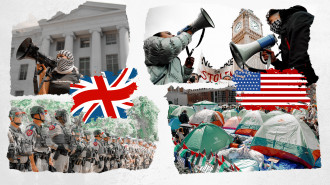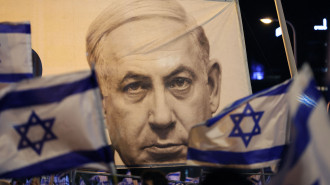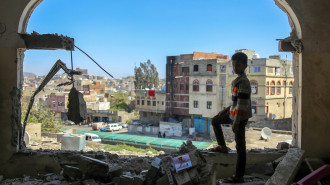
'In cold blood': Seeking justice for British army war crimes in Afghanistan

Last week, the UK Ministry of Defence (MoD) confirmed for the first time that UK Special Forces are at the centre of a war crimes inquiry, shedding light on alleged unlawful killings in Afghanistan.
This development comes after years of reporting and pressure from bereaved families and media outlets, including the BBC.
The decision to acknowledge the involvement of Special Forces units marks a significant shift in the MoD's stance, which had previously sought to restrict any mention of such involvement. It also reopens the door to prosecute soldiers after previous investigations were shut down.
After joining the US-led invasion of Afghanistan in 2001, most British troops left in 2014. Around 750 remained to train local forces until NATO’s full withdrawal in 2021. At its peak, there were around 137 British bases and 9,500 troops in the Helmand province alone.
In recent years, media attention on Britain's role in Afghanistan has increased, fuelled by pressure around human rights and legal concerns as well as a growing public interest in understanding the activities of British troops in the country.
"According to the BBC report, unarmed Afghans were routinely shot to death 'in cold blood' by Special Air Service troops during nighttime raids, and weapons were planted on them to justify the murders"
Leigh Day, the law firm representing Afghan families at the inquiry, said “at least 30 suspicious incidents which resulted in the deaths of more than 80 individuals” occurred between 2010 and 2013.
“I welcome the news that the MoD is no longer seeking to restrict mention of the UK Special Forces as alleged perpetrators of unlawful killings. This is a rare and positive small step forward,” Ruth Blakeley, Professor of Politics and International Relations at the University of Sheffield, told The New Arab.
“Lawyers, human rights investigators and academics have been raising concerns for many years of successive attempts to cover up credible evidence of UK collusion in torture and in unlawful killings of terror suspects.”
Lord Justice Haddon-Cave, the chair of the inquiry, emphasised the importance of transparency and public confidence in the proceedings. He acknowledged that as much evidence as possible should be heard in public to address public concerns.
However, he also recognised that certain evidence, due to national security considerations, would need to be heard in closed hearings.
Extensive investigations by BBC Panorama and The Sunday Times have revealed troubling claims pointing to the alleged involvement of UK Special Forces in unlawful killings during their operations in Afghanistan.
According to the BBC report, unarmed Afghans were routinely shot to death “in cold blood” by Special Air Service (SAS) troops during nighttime raids, and weapons were planted on them to justify the murders.
One particularly alarming claim emerged from Panorama’s long-running investigation, which reported that a specific SAS unit operating in Afghanistan in 2010 and 2011 was responsible for the suspicious deaths of 54 people within a six-month period.
|
|
The BBC also reported on a 2012 raid conducted by one unit, resulting in the killing of two young parents and the severe wounding of their two infant sons. These individual cases exemplify the gravity of the allegations and indicate potential violations against human rights.
Special forces commanders were reportedly concerned about the killing of over 33 people by another rogue unit in the space of three months during night raids on their homes, reported The Times.
The investigation cited a commander saying there was a “deliberate policy” of killing Afghan men, even when “they did not pose a threat” – which the commander called “indefensible behaviour” that “could be criminal.” According to leaked emails, an SAS sergeant-major referred to one incident as "the latest massacre!”
“The recent decision to allow, potentially, open discussion and public reporting of these alleged involvements during the inquiry's hearings signifies a change in approach,” Iain Overton, executive director of Action on Armed Violence (AOAV), told The New Arab.
"The outcome of the investigation is eagerly anticipated, and could set an important precedent for how cases of military misconduct and human rights violations will be addressed moving forward"
“Regarding the pattern of transparency issues and abuses in Afghanistan, investigations have uncovered troubling instances in the past. Evidence, including reports from AOAV and the BBC, has pointed to specific incidents involving UK Special Forces, raising concerns at the highest echelons,” added Overton.
“These incidents include allegations of unlawful killings and policies that targeted all fighting-age males in raided homes, regardless of the perceived threat they posed.”
A spokesperson for the MoD told The New Arab that the ministry cannot comment further on the inquiry, but the ministry has stressed that most of the armed forces served in Afghanistan with courage and professionalism.
The ministry previously warned its soldiers could be put “at risk” in the field and reputationally, following the BBC’s investigation.
The MOD has requested automatic anonymity for all Special Forces personnel involved in the operations, as well as closed hearings for all witness evidence related to the operations, away from both the bereaved families and the public.
"So far, no UK personnel, whether from the intelligence services, the military, or the UK officials that allowed it and turned a blind eye to it, have been held accountable or prosecuted,” said Ruth Blakeley.
“This is despite mounting evidence of serious collusion in hundreds of cases of torture, as confirmed by the 2019 UK Intelligence and Security Committee investigation, and of involvement in unlawful killings.”
“Officials have gone to great lengths to suppress the evidence from being heard in open court, and from restricting meaningful public inquiry,” she added. “Pressure needs to be maintained to ensure full accountability and redress for victims of War on Terror human rights abuses at the hands of UK personnel.”
|
|
In 2016, the Ministry of Defence announced that 120 royal military police (RMP) personnel were investigating potential mistreatment of abuses by British troops towards Afghan detainees from 2005 to 2013, encompassing over 600 allegations from 150 individuals.
Yet the investigation, known as Operation Northmoor, was closed in 2019 without any prosecutions of troops.
“The ongoing inquiry provides an opportunity to delve deeper into these allegations and shed light on the actions of UK Special Forces in Afghanistan,” said Overton.
“It is crucial for transparency and justice to prevail in the face of such serious allegations. The inquiry should be conducted in a thorough and fair manner, respecting national security concerns while upholding the values of human rights.”
In 2021, the International Criminal Court discontinued its investigation into violations in Afghanistan, which included the United States. Given that London was a key partner in the US-led invasion and war, it has also evaded further investigations so far.
The British military is not the only one facing growing pressure regarding its role in Afghanistan. In March, Australia brought a war crime charge against a soldier after a joint investigation by the government and AFP.
Following Australia’s decision, Human Rights Watch (HRW) has also called for increased efforts to pursue justice in other cases, particularly those involving the UK and the US.
Going forward, the hopes are that the war crimes inquiry will be conducted with transparency, justice and a thorough examination of the reported actions.
The outcome of the investigation is eagerly anticipated, and could set an important precedent for how cases of military misconduct and human rights violations will be addressed moving forward.
Jonathan Fenton-Harvey is a journalist and researcher who focuses on conflict, geopolitics, and humanitarian issues in the Middle East and North Africa.
Follow him on Twitter: @jfentonharvey
![British soldiers of the 1st batallion of the Royal Welsh patrol in the streets of Showal in the Helmand province on 25 February 2010. [Getty]](/sites/default/files/styles/large_16_9/public/1248042131.jpeg?h=4c44c727&itok=RQD9UnmX)
![While most British troops left Afghanistan in 2014, a few hundred remained until the official US-led withdrawal in 2021. [Getty]](/sites/default/files/styles/large_16_9/public/458681890.jpeg?h=9f66ed04&itok=SDQUKZY9)


